Charity Sunshine Tillemann-Dick developed a strong testimony of faith and a love of singing at a very early age. These gifts helped comfort her through the death of loved ones, and saved her own life on multiple occasions. Charity is an opera singer, an author, a recipient of two double lung transplants, a survivor of cancer, and she’s not even 35 years old. She discusses all of this in her new memoir, The Encore: A Memoir in Three Acts. Charity has learned to value the gift of time, and believes that while we live we should create.
When did you begin singing?
Oh gosh, I knew I wanted to be an opera singer when I was five and so I was singing before that. I think my mom put me into my first formal auditioned choir when I was three. So I’ve been singing for a really long time.
You come from a family of go-getters. Your entire family is extremely motivated. How did your parents raise so many children to accomplish so much in such short periods of time?
Chores, healthy competition and survivors’ guilt / responsibility were all very powerful motivators.
We had a lot of chores growing up and school was a lot more fun than chores, so we were always looking for an excuse to do schoolwork instead of chores.
With competition, we weren’t exactly competing against each other, but none of us wanted to be the weak link. Being homeschooled didn’t give us a norm to judge ourselves against and so fear that we would fall behind was this excellent motivator.
I don’t think any of us could really stomach the idea of letting anyone down who came before us or afterward. We didn’t want to let our parents down. We didn’t want to let ourselves down. We didn’t want to let our ancestors down either. I talk about both of these things at greater length in my book, but my maternal grandparents were Holocaust survivors and my baby brother died when I was very young. Their legacies reminded us all that there were a lot of lives we needed to make up for.
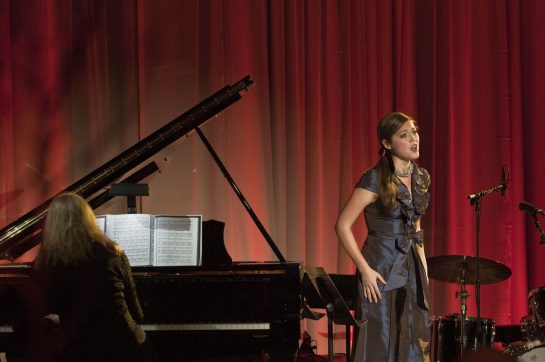
You received your bachelor’s degree in politics and economics right?
Yes
Did you choose politics because of your grandfather?
I allude to this in The Encore, but with a name like Charity Sunshine, I wanted to be taken seriously and I had a hunch that wasn’t going to happen if I was a musician.
I started college very young and my fields of study gave me a great grounding in writing and research. I intended to study music too, but I went to a very small Jesuit college and they didn’t have a music program. While I was there, I did a petition drive to establish a music program. By the time I graduated we had a minor in music and now they have a wonderful music program at the school, but it was a little late for me. I was planning on going to law school.
Right after I graduated, I planned to work for my state party, but my aunt was running for congress so I went to New Hampshire to help on her campaign. It was very emotionally and physically demanding – especially because it was family — so I made time to practice my piano and singing at least a few times a week. As I would sing by that keyboard, it was the only time during that season I felt joy. By the end of the campaigns, I knew I’d just hate myself if I didn’t at least try my hand at music and I’m so glad I did. I think I’d be dead if I’d gone to law school.
You were diagnosed in 2004 with Idiopathic Pulmonary Arterial Hypertension (PH) at the age of 20. Five years later you had your first double lung transplant. Then two years after that you had another double lung transplant. Could you tell me about your surgeries?
The first surgery was really hard. I was in a coma for 34 days. I was in the hospital for 100 days and then I was recovering at home for about four months. I really didn’t want that first transplant. It’s funny because it didn’t seem to want me either. It rejected after a year, but I’m grateful for those Texas lungs. I would have died without them.
I found out about the rejection a year before my second transplant. Within a few months, I saw my physical abilities significantly decline. And then I got this transplant I didn’t expect. This time I was up in two days. I was off the ventilator in a week. I was out of the hospital in a month and a half. I got out of the hospital in March and my first performance was in May at the Indianapolis Opera. It was a really different trajectory. And so far it’s been a really good match.
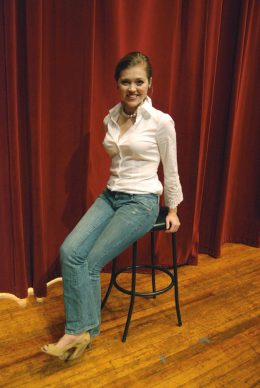
When were you diagnosed with cancer?
I had my first cancer late in 2015. In 2016 it got worse. It metastasized. Cancer, you never totally recover from. That’s the crummy thing about it. You’re never out of the woods. It’s been a journey. Me and my big brother, Jesus, have gotten into big fights over this one. #truestory.
There’s so many different types of cancer, but to add a lung transplant to that, how does that work? What was that like for you?
Everyone should be an organ donor. It is one of the greatest gifts we can give one another. Transplant gave me my life back but it also compromises the immune system. So cells my immune system would have likely killed off in a normal person turned into very poorly differentiated and serious cancer cells that reproduced extremely quickly.
This all happened at the same month that a contract on my dream house fell through, my editor left my publisher, the church policy change of 2015 took place leading to my crisis of faith and I gave my mom the first draft of my manuscript, putting significant strain on our relationship.
That month, I thought this freckle on my forehead was changing. It was biopsied and I felt like my dermatologist wasn’t taking it seriously. Meanwhile, it was growing every single day, changing and getting bigger. By the time they took it out, it was the size of a spherical kumquat right in the middle of my forehead. Then, it metastasized, moving to my parotid gland and invading my facial nerve. It went from the size of a pinhead to the size of my fist in two and a half weeks.
My treatment was managed at the same hospital where I received my transplant. I was on high doses of chemotherapy and I had daily radiation treatments. My already suppressed immune system was crazy weak so I wasn’t really supposed to be around people. I housesat for a friend who lived in Cleveland. My husband was there. Other than going for treatment, I didn’t go anywhere. So for a few months, I didn’t go to church. The missionaries or members of the ward brought me the sacrament for three months. It was really important for me. I read my scriptures a lot. I prayed even though I didn’t really want to talk with God. I yelled a lot. For the first time in my life I got into screaming matches with my Heavenly Family. It was a one-way screaming match. They didn’t scream back. I felt like they had screamed by what had happened to me with the cancer. I think it was good. I think it allowed me the space I needed to figure out how I was going to function in this new capacity. I was really grateful that I didn’t have to deal with my community and people that I knew because I couldn’t face myself. And when you can’t face yourself it’s really hard to know how you’re going to face others.
You are able to weave your testimony so seamlessly and so beautifully throughout your book, did you feel like you had to share things about your faith?
For me, it was very natural to talk about my faith. I could not write a memoir without writing about my relationship with my Heavenly Father and my spiritual community. I think sometimes we confuse the one for being both. As a community, we are woefully imperfect. Sometimes, my relationship with my heavenly parents feels that way too. I really do feel like Jesus and Heavenly Father and Heavenly Mother are a part of my family. Sometimes, they are these wonderful, benevolent forces of love and sometimes I feel totally neglected. It feels like a very human relationship. Mormon theology really helps with that. Sometimes I’m like, why isn’t Heavenly Mother in charge? She’d be nicer. But my faith is so integral to the person I am that the different aspects of the very real relationships I have with Mormonism and my heavenly family would have been impossible to extricate from the story.
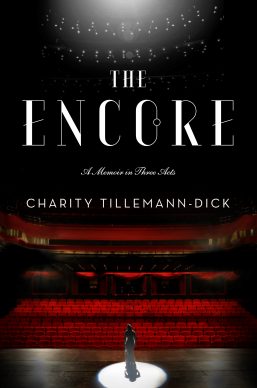
Did you ever feel that your prayers weren’t being heard or going unanswered and if so, how did you deal with that?
So here’s the hard thing. I always feel my prayers are answered, but frequently they’re not answered in the way I want them to be answered. It’s so annoying. Sometimes, its more than annoying, sometimes it’s life-threatening. When I was waiting for my second transplant, I kept getting blessings telling me to be patient. This was when I was on pretty advanced life support and it didn’t feel like we had room for patience. While there were all sorts of things that happened that let me know that God did see me and he did hear me, it was just very challenging to heed the answers I was getting. With cancer, I felt a real spiritual absence. It was my cross-bearing moment. I knew that something was on the other side and I knew that God was aware of me, I just didn’t feel it. It might have been because I was so hurt and angry that I couldn’t face God. I felt so hurt. I had been through so much. That He could stand by and let my physical identity be marred along with all of the other identities I had to reimagine or shed felt cruel. While the experience was unimaginably spiritually lonely, people filled in in a way I didn’t expect them to. I have found that when I experience a spiritual absence there’s a human presence that I’m not used to.
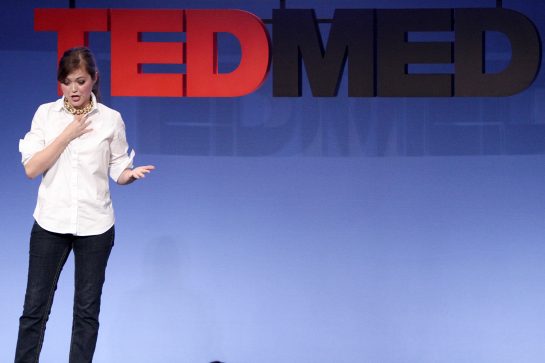
In one of your TED Talks you say, “Death has kind of been a defining thing in your life.” How have all of the deaths in your family and your personally facing it changed your perspective on life?
I love life. It’s the most incredible adventure that we’re all on together and I just want to make sure that I live exactly the life I’m supposed to. That responsibility can almost be scarier than death, which from where we sit, looks relatively straightforward. I’m confident that whenever I ultimately die, it will be my time. That part of my story, I don’t have that much influence over. I have a lot to do with what happens now which is this massive responsibility. I think it was one of the things that made writing my book so painful – so stressful. I had this publishing deal and I knew telling mine and by association, my family’s story was this trust and living up to it was extraordinarily challenging. If I wasn’t honest enough, the story wouldn’t be any good or true. If I was too honest, I knew I would hurt people I love. In certain respects, that experience was a microcosm of life. We have this time on earth and the opportunity to make something of our lives which can create good, bad, or some of both. It’s a lot of pressure.
Are you still singing?
Yes! I have my debut at Symphony Hall in Boston coming up on October 15th. I’m debuting this beautiful song cycle. Then I’ll be in 12 cities over the next couple of months doing events, going to bookstores and doing performances.
Would you ever want to write another book?
If I said yes to that question, my husband might just kill me. While the end result is very rewarding, memoirs are very punishing.
So what are you working on next?
I’ve launched an initiative with Donate Life America called the Donate Life #MyEncore challenge. It’s all about second chances, redemption, storytelling and saving lives. You share a story of your own second chance on Facebook or Instagram, register as an organ donor at www.donatelife.net/myencore and tag and challenge five friends to join you.
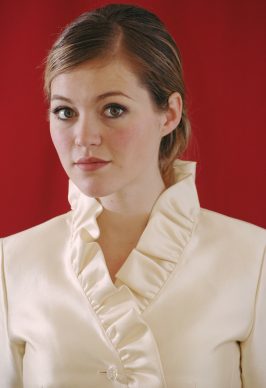
What advice would you give young people about using time wisely, accomplishing their goals, and living their dreams?
Some clichés are true. Time is everything we have here. When we die, no one will regret binge-watching too little TV. Our birthright is to create in whatever context we can. I may or may not be able to have babies, but I am creating things all the time. Not everyone sings, not everyone dances, not everyone writes; we don’t have the same gifts and the same talents. We are as different as the components of our bodies.
So go make something. Go make a relationship. Go make a phone call. Go make a community group. Participate in making something. There’s a group of women in Utah who started this group called Mormon Women for Ethical Government, which I love. In a little way, I’ve been involved in building it. That’s what we do in the church too, we build up the Kingdom of Zion on earth. But this action is what allows for second chances, for redemption – for each of our own encores in life.
At A Glance
Name: Charity Tillemann-Dick
Age: 34
Location: Washington, DC
Marital History: Married
Occupation: Soprano, presenter, and writer
Schools Attended: Regis University, Peabody Institute at Johns Hopkins University, Liszt Academy of Music
Favorite Hymn: Changes all the time, but right now, “God is Love”
Website: www.charitysunshine.com
Interview Produced by Leslie Schwartz-Leeper
